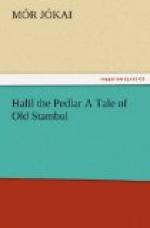“Glorious Padishah! as the merit of thy elevation belongeth not to me but to thy people, let the reward be theirs whose is the merit. A heavy burden oppresses thy slaves, and the name of that burden is Malikane. It is the farming out of the taxes for the lives of the holders thereof which puts money into the pockets of the high officers of state and the pashas, so that the Sublime Porte derives no benefit therefrom. Abolish, O Padishah, this farming out of the revenue, so that the destiny of the people may be in thy hands alone, and not in the hands of these rich usurers!”
And with these words he waved his hand defiantly in the direction of the viziers and the magnates.
Deep silence fell upon them. Through the closed doors resounded the tempestuous roar of the multitudes assembled around the Seraglio. Those within it trembled, and Halil Patrona stood there among them like an enchanter who knows that he is invulnerable, immortal.
But the Sultan immediately commanded the Ciaus Aga to proclaim to the people with a trumpet-blast at the gates of the Seraglio, that at the desire of Halil Patrona the Malikane was from this day forth abolished.
The shout which arose the next moment and made the very walls of the Seraglio tremble was ample evidence of the profound impression which this announcement made.
“And now place thyself at the head of thy host,” said Halil, “accept the invitation of thy people to go to the Ejub mosque, in order that the Silihdars may gird thee with the Sword of the Prophet according to ancient custom.”
The Sultan thereupon caused it to be announced that in an hour’s time he would proceed to the mosque of Ejub, there to be girded with the Sword of the Prophet.
With a shout of joy the people pressed towards the mosque in their thousands, crowding all the streets and all the house-tops between the mosque and the Seraglio. The cannons of the Bosphorus sent thundering messages to the distant mountains of the joy of Stambul, and an hour later, to the sound of martial music, Mahmud held his triumphal progress through the streets of his capital on horseback; and the people waved rich tapestries at him from the house-tops and scattered flowers in his path. Behind him came radiant knightly viziers and nobles, and venerable councillors in splendid apparel on gorgeous full bloods; but in front of him walked two men alone, Halil Patrona and Musli, both in plain, simple garments, with naked calves, on their heads small round turbans, and with drawn swords in their hands as is the wont of the common Janissaries when on the march.
And the people sitting on the house-tops shouted the name of Halil just as often and just as loudly as they shouted the name of Mahmud.
The firing of the last salvo announced that the Sultan had arrived at the Ejub mosque.
Ispirizade, the chief imam of the Aja Sophia mosque, already awaited him. He had asked Halil as a favour that he might bless the new Sultan, and Halil had granted his request. Since he had ventured into the Seraglio everyone had obeyed his words. The people now whispered everywhere that the Sultan was doing everything which Halil Patrona demanded.




